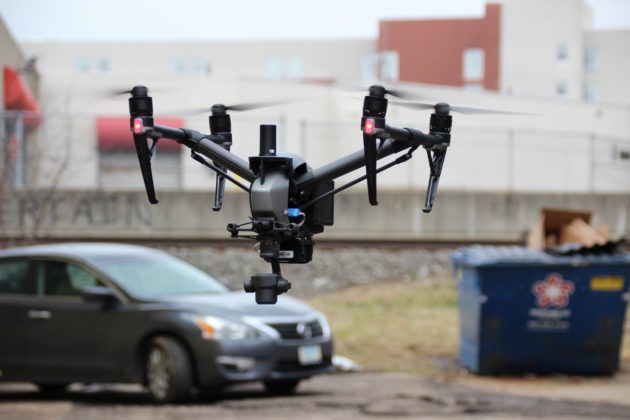
Drone deliveries are coming.
While some autonomous transportation technologies like self-driving cars are still years or even decades away from entering our everyday lives, you can expect to receive packages via drones in the near future.
That’s according to Dick Zhang, CEO of Identified Technologies, a 3D drone mapping startup based in Pittsburgh. I visited the company’s headquarters as part of our GeekWire HQ2 coverage last month.
Identified Technologies sells an end-to-end drone product that provides job site data and analytics to construction and mining companies. For the past half-decade Zhang has been entrenched in the drone industry and expects delivery drones in the near future.
“It’s going to happen,” he said.

The technology seems to be ready for delivering everything from pizza to packages. Amazon, for example, has made significant progress in its prototype testing program since making its initial drone delivery announcement in 2013.
“The beauty of the drones is that they just fly from building to building,” Zhang said. “If you give it its own air traffic controls, it just follows where it’s supposed to go. It’s remarkable how precise the control is on these autonomous drones. It’s cool to watch.”
In some parts of the world, commercial drone deliveries could become routine by as early as 2020.
“Over the next five years drone delivery will become common,” Zhang said. “Delivery drones are already in the same developmental phase as self-driving cars, with beta deployments in multiple countries around the world. Now it’s just a matter of getting the test mileage for the technology to be approved and regulated.”
But there are hurdles that could impede drone deliveries ever becoming mainstream given regulatory complexities and potential safety concerns, particularly for out-of-sight drones flying above populated areas.
For example, knowing what drones are flying where, and by whom, are top of mind for regulators. The Wall Street Journal reported this week that the White House is preparing legislation that would allow federal law enforcement and homeland security to “disrupt or neutralize suspicious aircraft piloted from the ground.” More than one million drones have been registered with the FAA, including 70,000 for commercial use, the Journal reported.
It’s a similar situation for transporting actual people in autonomous drones. Last week Boeing’s CEO said air taxis could be coming sooner than expected. But he noted that the timetable for technology adoption will depend on how quickly regulators work out the “rules of the road” for autonomous flight.
Automakers are also thinking about flying cars. On Tuesday Porsche said it is exploring designs for an aerial vehicle but cautioned that it could be a decade until the technology is ready. Uber is also working on cars in the air; its CEO expects them to be used in five to seven years.
Not everyone is gung-ho about air taxis. Elon Musk, the billionaire CEO of SpaceX and Tesla, has repeatedly questioned whether they’d be safe enough for passenger transport.
“If you love drones above your house, you’ll really love vast numbers of ‘cars’ flying over your head that are 1,000 times bigger and noisier and blow away anything that isn’t nailed down when they land,” he tweeted sarcastically last month.
Inside Identified Technologies
Identified Technologies is one of hundreds of companies working in a drone market that Goldman Sachs forecasted to reach $100 billion between 2016 and 2010.
“Like the internet and GPS before them, drones are evolving beyond their military origin to become powerful business tools,” Goldman Saches noted. “They’ve already made the leap to the consumer market, and now they’re being put to work in commercial and civil government applications from firefighting to farming. That’s creating a market opportunity that’s too large to ignore.”
Identified Technologies originally built its own drones but is now investing more on the software side, working with customers across the country in the construction and excavation industry to create detailed 3D maps of massive job sites using autonomous drones and an array of sensors.
“Most of the opportunity as it relates to drones is not actually with the drones themselves anymore, but it’s software as a service tangential to drones,” Zhang noted.

The company’s customers traditionally assessed a job site with helicopters, planes, or satellite imagery. The drones, in combination with sensors placed around a site, offer a cheaper and more effective alternative, Zhang said. It flies across a site like a lawnmower, capturing millions of data points on a single flight that is pre-programmed using the company’s software, which stitches together hundreds of photos to create a 3D model. The end result is granular data that shows where work has or hasn’t been done; earthwork quantities; surface changes; heat maps; volumetric analysis; physical deterioration; and more.
“There’s a huge disconnect between what actually happens in the physical world and what’s planned in the digital world,” Zhang said. “That’s what leads to trillions of waste in construction. We help customers price and win more bids; operate more profitably on jobs they win; and drive up utilization of equipment.”

Zhang sees how the company’s technology is being used at various job sites. For example, he was recently at a gold mine where workers use drones to better understand changes in dirt, thus improving their chances of finding hotspots.
“The scale of what is at stake here is tough to comprehend,” Zhang said. “The data is extremely important.”
Zhang was a 19-year-old sophomore at the University of Pennsylvania when he dropped out of school and drove west to the Steel City with a suitcase and a toy drone in a shoebox. He had just won a business plan competition and was accepted into the first cohort of AlphaLab Gear, a Pittsburgh-based hardware startup accelerator.
Now Zhang leads a 25-person company based in an old warehouse 15 minutes east of downtown Pittsburgh. Identified Technologies, which has raised $3.7 million, grew revenue by annual 300 percent last year expects to double its team over the next 18 months.





